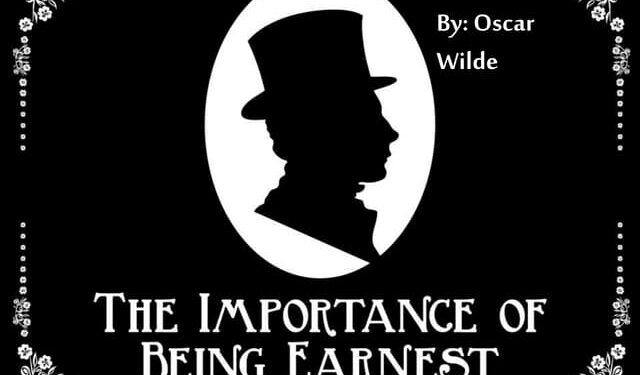Introduction
The Importance Of Being Earnest By Oscar Wilde “The Importance of Being Earnest,” first performed in 1895, is a sparkling comedy of manners that critiques Victorian society’s values and the triviality of its social conventions. The play follows the lives of two young men, Jack Worthing and Algernon Moncrieff, as they navigate the complexities of love, identity, and social expectations. Through clever dialogue, mistaken identities, and a series of humorous situations, Wilde explores themes of authenticity, deception, and the absurdities of the upper class. This article provides a detailed act-wise summary of the play, highlighting its key characters, plot developments, and thematic significance.
Act I
Setting the Stage
The play opens in Algernon Moncrieff’s elegantly furnished London flat, characterized by its lavish décor, which reflects the affluence and idleness of the characters. Algernon, a charming and witty young man, is preparing to entertain his friend Jack Worthing. The dialogue quickly establishes Algernon’s playful nature and his penchant for indulging in the frivolities of life.
READ MORE
The Introduction of Characters
As Algernon awaits Jack’s arrival, he converses with his butler, Lane, revealing a glimpse of the absurdities in their lives. Lane is a dryly humorous character who plays a pivotal role in highlighting the class distinctions and social dynamics at play.
When Jack arrives, he is introduced as a man of considerable means who maintains a country estate in Hertfordshire. The conversation reveals Jack’s secret: he leads a double life, presenting himself as “Ernest” in the city while being “Jack” in the country. This dual identity allows him to escape his responsibilities and engage in romantic pursuits.
A Proposal
The plot thickens when Jack confesses to Algernon that he intends to propose to Algernon’s cousin, Gwendolen Fairfax. Algernon’s witty remarks about Jack’s intentions underscore the play’s comedic tone and the absurdity of societal norms surrounding marriage. When Gwendolen arrives, the two men quickly fall into flirtation, and the audience sees Gwendolen’s fascination with the name “Ernest.”
The Importance of Names
The theme of names and identity emerges as a central motif. Gwendolen reveals that she can only love a man named Ernest, symbolizing the superficiality of romantic ideals in Victorian society. The act closes with Jack and Gwendolen becoming engaged, setting the stage for the ensuing comedic misunderstandings.
Act II
The Country Home
The second act takes place in Jack’s country home, where he hopes to introduce Gwendolen to his ward, Cecily Cardew, a charming and imaginative young woman who has been raised in the country. The act begins with Cecily and her governess, Miss Prism, discussing the importance of education and the absurdities of adult life.
The Arrival of Gwendolen
Gwendolen and Jack arrive at the country house, and tensions rise when it is revealed that Gwendolen has also been informed about Jack’s name being “Ernest.” The misunderstanding heightens the comedic tension as both women believe they are in love with a man named Ernest, leading to a farcical situation.

Algernon’s Deception
Algernon arrives shortly after, having assumed the identity of “Ernest” to pursue Cecily. The comedic irony of Algernon courting two women named Gwendolen and Cecily deepens the play’s exploration of identity and the absurdity of romantic entanglements. Algernon’s charming and playful demeanor quickly wins over Cecily, who is captivated by his fabricated persona.
The Confrontation
As the act progresses, the misunderstandings and deceptions culminate in a confrontation between the characters. Cecily and Gwendolen meet and quickly realize they are both engaged to men who share the same name. Their reactions highlight the absurdity of the situation and the superficiality of their romantic attachments.
Cecily’s imaginative storytelling contrasts with Gwendolen’s more conventional approach to romance, illustrating the different ways women navigate societal expectations. The two women momentarily bond over their shared predicament before returning to their rivalry.
READ MORE
The Climax
The act reaches a climax when Jack, frustrated by the chaos of his double life, attempts to reveal the truth about his identity. However, he is thwarted by Algernon’s playful interruptions and the women’s stubbornness. The act ends on a humorous note, with the audience left in anticipation of how the characters will navigate their tangled web of lies.
Act III
Revelations and Resolutions
The final act begins in the garden of Jack’s country home, where the characters’ misunderstandings continue to unravel. The atmosphere is filled with tension as the truth of each character’s deception begins to surface.
The Return of Miss Prism
Miss Prism, Cecily’s governess, returns to the scene, and her presence adds further complexity to the narrative. She inadvertently reveals the circumstances surrounding Jack’s mysterious origins, leading to a series of revelations that challenge the characters’ assumptions about identity and family.
The Identity of Jack
As the act progresses, Jack learns the truth about his parentage. Miss Prism reveals that she once lost a baby in a handbag, leading to the revelation that Jack is the child of the wealthy Lady Bracknell. This discovery complicates Jack’s previous self-image and provides a humorous commentary on the absurdity of social class and lineage.
The Confrontation with Lady Bracknell
Lady Bracknell, Gwendolen’s mother, makes a grand entrance, embodying the epitome of Victorian propriety and snobbery. Her interrogation of Jack about his background reflects the rigid social conventions of the time. The comedic tension heightens as Jack attempts to navigate Lady Bracknell’s expectations and prejudices.
The Resolution of Conflicts
Ultimately, the conflicts are resolved through a series of witty exchanges and comedic misunderstandings. The characters confront their romantic entanglements and negotiate their relationships in a manner that underscores the absurdity of societal norms. Gwendolen and Cecily’s rivalry dissipates, and they ultimately agree to accept their respective suitors.
READ MORE
The Importance of Being Earnest
In a final twist, the theme of earnestness takes center stage. Jack’s realization that he has been living a lie prompts him to embrace his true identity. The play concludes with a humorous reflection on the nature of truth, identity, and the importance of being “earnest” in a world filled with pretense.
Themes and Analysis
Identity and Deception
One of the central themes of “The Importance of Being Earnest” is the exploration of identity and deception. The characters’ use of false identities reveals the absurdity of social conventions and the lengths individuals will go to navigate societal expectations. Wilde critiques the superficiality of identity based on names and social status, highlighting the disconnect between appearance and reality.
The Nature of Love and Marriage
Wilde’s play satirizes the institution of marriage and the societal pressures surrounding it. The characters’ romantic pursuits are driven by superficial qualities, such as names and social standing, rather than genuine affection. The play raises questions about the authenticity of love in a society preoccupied with appearances.
Social Critique
Through its comedic lens, “The Importance of Being Earnest” critiques the values of Victorian society, particularly its emphasis on propriety, social class, and moral hypocrisy. Wilde uses humor to expose the absurdities of upper-class life, highlighting the disconnect between societal expectations and individual desires.
The Absurdity of Social Conventions
The play underscores the absurdity of social conventions and the lengths individuals will go to conform to them. Wilde’s witty dialogue and exaggerated characters serve to highlight the ridiculousness of societal norms, inviting the audience to question the validity of these conventions.
The Role of Women
Wilde presents complex female characters in Gwendolen and Cecily, who navigate the constraints of their society with wit and intelligence. Their interactions reveal the limitations placed on women in the Victorian era, while also showcasing their agency and resilience.

Conclusion
“The Importance of Being Earnest” is a timeless comedy that deftly critiques Victorian society’s values and the absurdities of social conventions. Through its engaging characters, witty dialogue, and exploration of themes such as identity, love, and social critique, Wilde crafts a narrative that remains relevant today. The play invites audiences to reflect on the nature of authenticity and the importance of being true to oneself in a world filled with pretense.
(FAQs)
1. What is the main theme of “The Importance of Being Earnest”?
The main themes of the play include identity and deception, the nature of love and marriage, social critique, the absurdity of social conventions, and the role of women in Victorian society.
2. Who are the main characters in the play?
The main characters include Jack Worthing, Algernon Moncrieff, Gwendolen Fairfax, Cecily Cardew, Lady Bracknell, and Miss Prism. Each character represents different aspects of Victorian society and its values.
3. How does Wilde portray identity and deception in the play?
Wilde explores identity and deception through the characters’ use of false identities and the misunderstandings that arise from them. The play critiques the superficiality of social conventions and the absurd lengths individuals go to conform to societal expectations.
4. What commentary does the play make about love and marriage?
The play satirizes the institution of marriage and the societal pressures surrounding romantic relationships. The characters’ pursuits are often based on superficial qualities rather than genuine affection, raising questions about the authenticity of love.
5. How does Lady Bracknell represent Victorian society?
Lady Bracknell embodies the epitome of Victorian propriety and snobbery. Her character serves to highlight the rigid social conventions of the time and the absurdity of valuing social status over personal worth.
6. What role do women play in “The Importance of Being Earnest”?
Women in the play, particularly Gwendolen and Cecily, navigate the constraints of their society with wit and intelligence. Their interactions reveal both the limitations placed on women and their agency within those constraints.
7. How does Wilde use humor in the play?
Wilde employs clever dialogue, witty repartee, and absurd situations to create humor throughout the play. This humor serves to critique societal norms and expose the ridiculousness of upper-class life.
8. What is the significance of the title “The Importance of Being Earnest”?
The title reflects the central theme of authenticity and the contrast between appearance and reality. The play ultimately suggests that being “earnest” in one’s identity and relationships is more valuable than adhering to societal expectations.
READ MORE

















